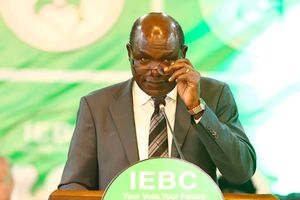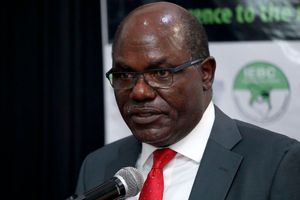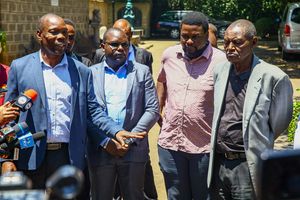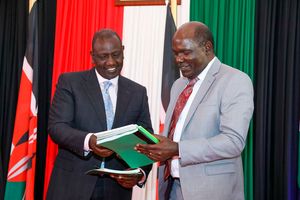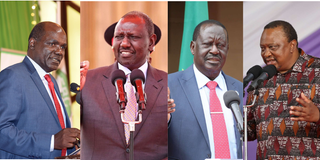
Former IEBC chair Wafula Chebukati, President William Ruto, former Prime Minister Raila Odinga and Retired President Uhuru Kenyatta.
If the former Independent Electoral and Boundaries Commission (IEBC) chairman Wafula Chebukati — who passed away on Thursday, February 20, at age 63 — were to relive his life, it is possible that he would not choose to lead the country’s electoral body again.
Refereeing elections in Kenya, a battleground for fiercely combative politicians backed by supporters who refuse to entertain the idea of defeat is an intimidating task.
In his tell-all book, Referee of a Dirty Game, former IEBC chairman Issack Hassan, who was hounded out of office in 2016, says it was a thankless job, especially when dealing with big-name politicians. His successor would learn this the hard way.
For Mr Chebukati, his six-year tenure at the IEBC was marked by a complex and often fraught relationship with key political figures, particularly Dr William Ruto, Mr Uhuru Kenyatta, Mr Raila Odinga —leaders whose followers’ fluid sentiments towards the electoral commission boss often mirrored that of the politicians.
Things had become particularly delicate after the disputed 2007 presidential elections led to Kenya’s worst political violence and triggered reforms.
Yet, Mr Chebukati often declared he had embraced the challenge, overseeing the controversial 2017 and 2022 General Elections.
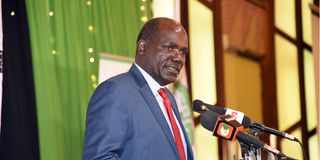
Outgoing IEBC Chair Wafula Chebukati delivering his speech at Safari Park Hotel during the launch of the post-elections evaluation report on January 16, 2023.
The 2017 presidential election, initially won by incumbent Uhuru Kenyatta ahead of opposition leader Mr Odinga who challenged the outcome, was nullified by the Supreme Court.
The then Chief Justice David Maraga cited it as “technically flawed in the measure of the rule of law.”
The “illegalities and irregularities” pointed out by the top court led to a repeat poll in October of that year, won easily by Mr Kenyatta and his running mate Dr Ruto but boycotted by Mr Odinga.
IEBC Chairman Chebukati resisted calls for his resignation and went ahead to lead the 2022 elections where Mr Kenyatta this time backed foe-turned-friend candidate Mr Odinga against then deputy president Ruto.
It is an election that divided the commission down the middle, further testing Mr Chebukati’s resolve as Dr Ruto emerged the unlikely winner.
Midst of political grudges
The 2022 ballot was not just another electoral contest — it was a battle of long-standing political grudges that put Mr Chebukati and his team under intense pressure.
As a referee in a game that decides the men or women to wield power, particularly in the race to State House, one would not have expected Mr Chebukati to be loved by key political formations and individuals that lead them.
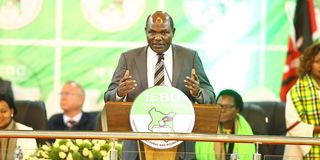
IEBC Chairman Wafula Chebukati address media during a briefing at Bomas of Kenya on August 10, 2022.
Ahead of the 2017 elections, Mr Odinga’s camp had no kind words for him while the so-called UhuRuto ticket often came to the defence of the IEBC, a commission that was hit by divisions that were to get worse with the largely new team working with Mr Chebukati in the next election cycle.
Right from the word go towards the 2022 General Election, Mr Chebukati was clearly a marked man. Dr Ruto and Mr Odinga wings picking him and IEBC as a battle zone.
But somehow, when Mr Odinga led his battalions to record expressions of mistrust against Mr Chebukati, the Ruto camp adopted right from the word go a demeanour that he was okay and they trusted him.
But for Mr Odinga and Mr Chebukati, theirs was a relationship that begun much earlier. In 2007 the man who would years later become the IEBC chairman ran on as Orange Democratic Movement (ODM) party ticket for the Saboti parliamentary seat, losing to Eugene Wamalwa of PNU.
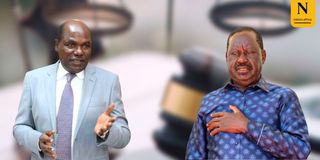
After the loss, Mr Chebukati resigned from his life membership in Mr Odinga’s ODM. In 2017, Mr Chebukati became Mr Odinga’s punching bag, with the Orange party boss using the nullification of the election as confirmation of the IEBC supremo’s bias towards President Kenyatta and Mr Ruto.
Mr Odinga called for reforms and opted out of the repeat October 2017 presidential elections when his demands were not met.
All the while, President Kenyatta and Dr Ruto, who was then Deputy President, defended the IEBC boss, asking Mr Odinga to subject himself to the repeat elections under the same Chebukati-led team after the Supreme Court decision.
For a while, especially in 2018 after President Kenyatta and Mr Odinga reached a political truce popularly referred to as the ‘handshake’, then Deputy President Ruto was suspicious of Mr Chebukati and his IEBC team.
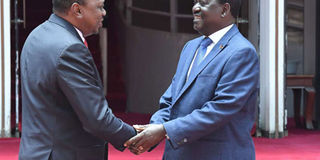
President Uhuru Kenyatta and opposition chief Raila Odinga at Harambee House on March 9, 2018. FILE PHOTO | NATION MEDIA GROUP
'Chebukati - Nasa night meetings'
At one time in August 2018, he claimed Mr Chebukati was holding night meetings with Mr Odinga’s camp, then known as the National Super Alliance (Nasa).
"I'm aware Chebukati is meeting NASA leaders at night. That could be why he is sending messages here and there, sensational memos. I'm asking him to stop writing memos and concentrate on delivering a credible election,” Dr Ruto said.
It is an accusation Mr Chebukati rejected as “false, reckless and baseless” but claims of such secret meetings with different camps continued in the run-up to the 2022 elections.
Months earlier, there were half-hearted calls by Mr Odinga’s camp to reconstitute IEBC but these faded away.
But as the elections approached, the Ruto camp appeared to soften its stance towards IEBC and defended Mr Chebukati against accusations of bias by Mr Odinga’s Azimio team.
“This is one thing we knew and capitalised on. We knew that the whole world was more interested in the Odinga contest since he was believed to be the risk factor in (terms of) stability if he lost and decided to dispute the loss,” said Kandara MP Alice Wahome, now Lands Cabinet Secretary, in an interview in 2022.
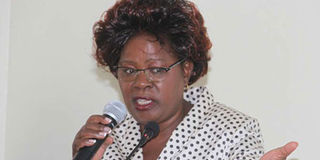
Kandara MP Alice Wahome. She is the Justice and Legal Affairs Committee vice chairperson. The JLAC wants political parities involved in matters concerning the IEBC. PHOTO | FILE | NATION MEDIA GROUP
Ms Wahome then said that Dr Ruto had evaluated the scenario a long time ago and appreciated that the IEBC led by Mr Chebukati was the best one to conduct the August 9, 2022 vote.
“We had no choice but love the IEBC the way it was. By publicly appreciating it and taunting our competitors that if they had a way of putting whoever they wanted to referee the game they should go right ahead and do it since we would not care was just for effect. We projected ourselves as confident and unafraid of losing,” she said.
Uasin Gishu Woman Representative Gladys Boss Shollei had then said in a previous interview that by Dr Ruto embracing IEBC and its commissioners, increased pressure on the opposing Azimio side.
“The world appreciated our candidate’s (Dr Ruto’s) easy and unconditional peace with IEBC and his declaration that he would accept results. Pressure moved to Mr Odinga to play catch-up, which he was late in doing hence keeping the global eyes on him,” she said.
With those politics surrounding the IEBC, Mr Chebukati remained in a beautiful position—supported by the world and one of the front runners in his defence.
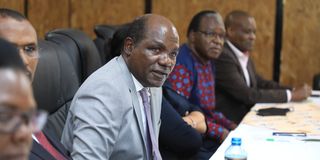
IEBC led by chairman Wafula Chebukati meeting candidates of pending elections in the country at on August 22, 2022 in Bomas.
Mr Odinga’s case was not helped by his exchanges with Mr Chebukati as Azimio attempted to link the chairman with Ford Kenya leader Moses Wetang’ula, now Speaker of the National Assembly, while at the same time protesting against the contract to print the ballot papers and the technology system to be deployed.
Azimio official Junet Mohammed had claimed there was a secret deal, involving Dr Ruto’s allies, in the printing of the ballot papers by a Greek company.
Mr Chebukati denied all the accusations. He had also refused to work with a multi-agency committee to prepare for the election that had the security, cabinet, judiciary and the intelligence in it. This was seen to have been put together by the Kenyatta camp.
The results of the 2022 elections, won by Dr Ruto and his UDA, were unsuccessfully contested by Mr Odinga at the Supreme Court.
In the court filings, Azimio questioned the competence and integrity of two IEBC commissioners and its chairman, Mr Chebukati. By this time, the commission had been split with four commissioners -- Juliana Cherera, Francis Wanderi, Irene Masit, and Justus Nyangaya — dramatically disagreeing with the results announced by their chairman.
Three of these commissioners eventually resigned while Ms Masit was removed through a tribunal.
When on September 5, 2022, the seven judges of the Supreme court delivered their verdict that upheld Dr Ruto’s win, Mr Chebukati could not hide his joy for he risked exiting IEBC chairmanship with a blemish deep into his life.
One of the prayers that the Azimio had placed was that he be declared to have acted in a rogue manner, be removed from his position and be banned to ever hold public office.
“I now rest assured that we as all in IEBC have been vindicated. I have been vindicated too. My patriotism and love for my country remains unbowed. Rule of law and love for constitutionalism is the bane of my professional soul. I stand proud that we at the IEBC—regardless of the politics in it—had robust and transparent election infrastructure that ensured votes cast in the August poll were counted, electronically transmitted, verified, tallied, announced and declared in line with Articles 81 and 86 of the Constitution,” he said in a statement after the Supreme Court ruling.
He said that he was looking forward to exiting the stage in January 2023 happy that the electoral process in Kenya has come of age and it is a case study for many on how to conduct a free, fair, transparent and credible General Election that meets the democratic aspirations of the people. But Mr Odinga had a different view, accusing IEBC and the Supreme court for sabotaging the will of the people during the elections.
As Mr Chebukati exits, his legacy will inevitably be mixed. As IEBC Chairman, it comes with the territory.

